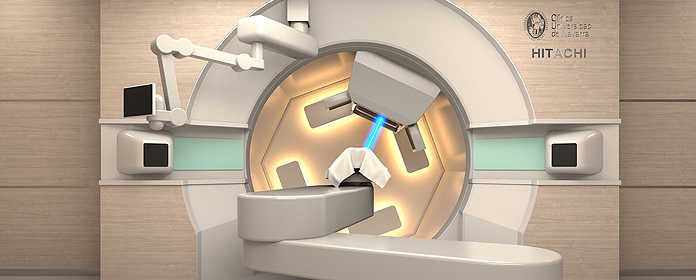The Clínica Universidad de Navarra builds the most advanced Proton Therapy Unit in Europe in Madrid.
The university hospital strengthens its university project thanks to the possibilities of enhancing its lines of research, the teaching and the transfer of knowledge in the field of oncology, radiobiology and advanced radiation physics.

The Clínica Universidad de Navarra is building what will be the Proton Therapy Unit at campus in Madrid. Proton Therapy Unit The new Unit, which will begin treating patients in the first quarter of 2020, incorporates Hitachi technology, the most advanced proton therapy unit in Europe, as a strategic structure within the University of Navarra Cancer Center (CCUN). The new Unit, which will begin treating patients in the first quarter of 2020, incorporates Hitachi technology equipment, the first of its kind in Europe and present in 27 academic centers, among which are international leaders in cancer treatment.
reference letter Thus, the Clinic will have the same technology and knowledge that is already available in international academic hospitals such as Mayo Clinic (at its Rochester and Phoenix sites), St. Jude Children's Research Hospital, MD Anderson Cancer Center, in the United States, and Hokkaido University Hospital, in Japan.
The Clinic's general director , José Andrés Gómez Cantero, has highlighted in this regard the strategic alliance with Hitachi to acquire this proton therapy equipment and thus fulfill the Clinic's main goal : to offer the best medicine to its patients. "The Clinic's own DNA, as a center professor and researcher, brings a added value to this Unit, reinforced by its integration into a Cancer Center within a general hospital with two closely coordinated sites, with the most advanced diagnostic technology, services and the latest advances for the treatment of cancer. All of this should allow us to offer the most effective combinations for each tumor, making personalized medicinea reality".
A commitment to researchDuring the presentation, Dr. Umberto Ricardi, director of the European Society for Radiation Oncology (ESTRO), stressed the need for this technology for those patients who are not amenable to conventional radiotherapy, which he estimated at 25% and who will be the first to benefit from proton therapy. He also predicted that in the future it will be necessary to optimize the lines of research in this area. "We know how important the relationship between proton therapy centers and scientific societies dedicated to research is to improve the scenario in which patients will receive proton therapy, as well as in the public interest".
Dr. Nobuyuki Osakabe, director of Hitachi's Healthcare Business Unit Technology, said, "We are honored to embark on this new association with the prestigious Clínica Universidad de Navarra. The Clinic's significant history, dedication to patient satisfaction, innovation and research, inspire Hitachi to expand new frontiers by providing Spain with a cancer therapy unparalleled in all of Europe."
The equipment acquired by the Clinic has involved an investment of 40 million euros (including all the necessary infrastructure) and establishes a strategic alliance with Hitachi and the entrance in the clinical and research partnership made up of the centers that have this technology.
Strategic Innovation in OncologyWith the incorporation of this new technology, Clínica Universidad de Navarra gives a new impulse to its strategy of care innovation in the field of Oncology. The Proton Therapy Unit will be led by Dr. Felipe Calvo, MD. Dr. Felipe Calvowho, together with Dr. Rafael Martínez Monge who together with Dr. Rafael Martínez Monge directs the department of Radiation Oncology. With this equipment, the Clinic reinforces its university project thanks to the possibilities of strengthening its lines of research, the teaching and the transfer of knowledge in the field of Oncology, radiobiology and the most advanced radiation physics.
goal The progressive interest in the implementation of this technology in the world and its high efficacy, proven in the units where it is already applied, has made the acquisition of such equipment in Spain a priority for Clínica Universidad de Navarra and for many Spanish professionals.
plenary session of the Executive Council D r. Carlos Ferrer, president of the Spanish Society of Radiation Oncology (SEOR), emphasizes that "the extensive existing experience has allowed this therapy to consolidate its position as the radiation of the future in the 21st century, as it allows great accuracy and effectiveness with less risk of inducing second tumors, competing with and improving existing techniques in many indications, as recently recognized by the American Society for Radiation Oncology (ASTRO)".
